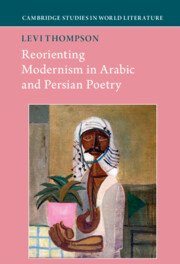Book contents
- Reorienting Modernism in Arabic and Persian Poetry
- Cambridge Studies in World Literature
- Reorienting Modernism in Arabic and Persian Poetry
- Copyright page
- Contents
- Acknowledgments
- Note on Transliteration
- Introduction
- Part I Crafting a Modernist Geography across Arabic and Persian Poetry
- Chapter 1 Formal Connections, Literary Criticism, and Political Commitment
- Chapter 2 Travel Forms
- Part II Imagining New Worlds
- Part III Aftermath
- Notes
- Bibliography
- Index
Chapter 2 - Travel Forms
Arabic Prosody, Craft, and Nīmā Yūshīj’s Persian New Poetry
from Part I - Crafting a Modernist Geography across Arabic and Persian Poetry
Published online by Cambridge University Press: 24 November 2022
- Reorienting Modernism in Arabic and Persian Poetry
- Cambridge Studies in World Literature
- Reorienting Modernism in Arabic and Persian Poetry
- Copyright page
- Contents
- Acknowledgments
- Note on Transliteration
- Introduction
- Part I Crafting a Modernist Geography across Arabic and Persian Poetry
- Chapter 1 Formal Connections, Literary Criticism, and Political Commitment
- Chapter 2 Travel Forms
- Part II Imagining New Worlds
- Part III Aftermath
- Notes
- Bibliography
- Index
Summary
Applies formal analysis to several of the early modernist poems Nīmā Yūshīj wrote in Persian in the 1920s and 1930s. I purposefully highlight how Nīmā incorporates not only premodern Arabic prosody, but also premodern Arabic literary devices – especially muʿāraḍah or “contrafaction”– into his modernist Persian poetry. Ultimately, I argue that he uses contrafaction to sublate the past into the present in a way that contrasts sharply with the Pahlavi dynasty’s use of the Iranian past (or rather, a very specific version of that past) to fabricate a new, modern, national myth. For instance, the Pahlavis built mausoleums for premodern Persian literary exemplars like Hafiz, Attar, Omar Khayyam, and the author of the Iranian national epic, Ferdowsi, highlighting their essential Persianness in opposition to the rich history of Islam and Arabic in the region. I read poems like 1926’s “The Swan” and 1938’s “The Phoenix” to show how Nīmā develops the planetary modernist theme of death and rebirth (perhaps best known as the thematic engine of Eliot’s The Waste Land) to his own ends. I argue that by treating poetry as a craft we can better understand how Arab and Iranian modernists resisted nationalist mythmaking by deploying the past differently.
- Type
- Chapter
- Information
- Reorienting Modernism in Arabic and Persian Poetry , pp. 48 - 70Publisher: Cambridge University PressPrint publication year: 2022



